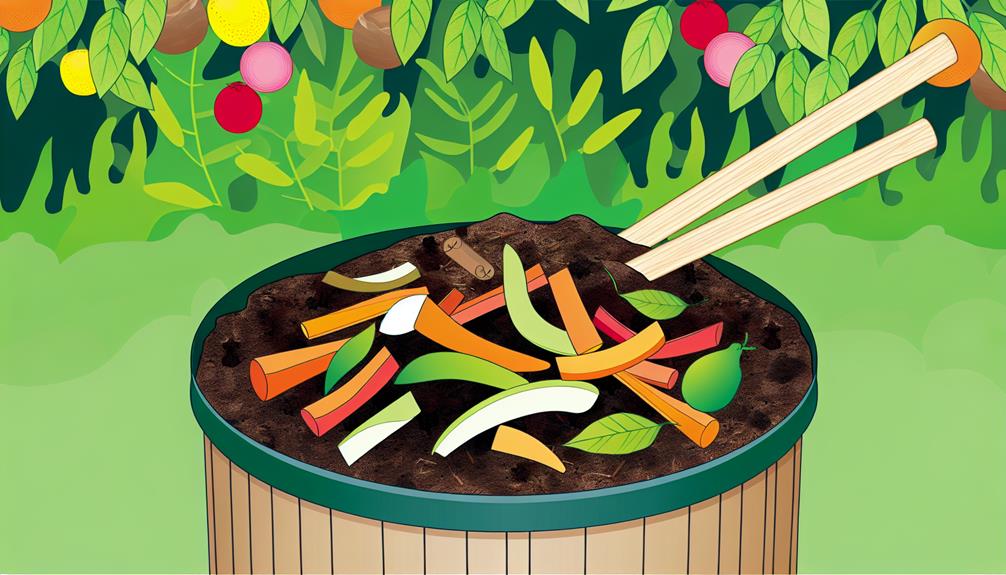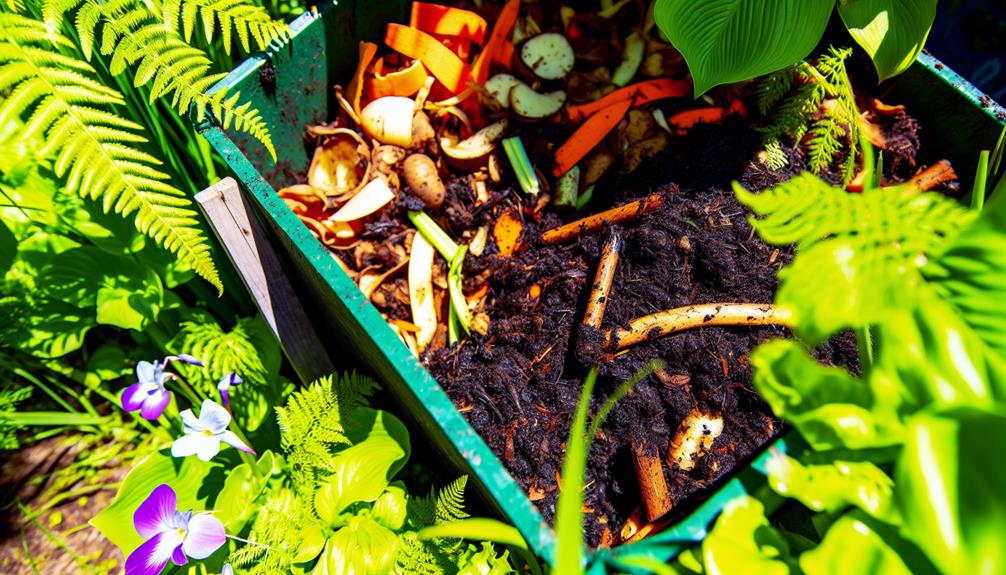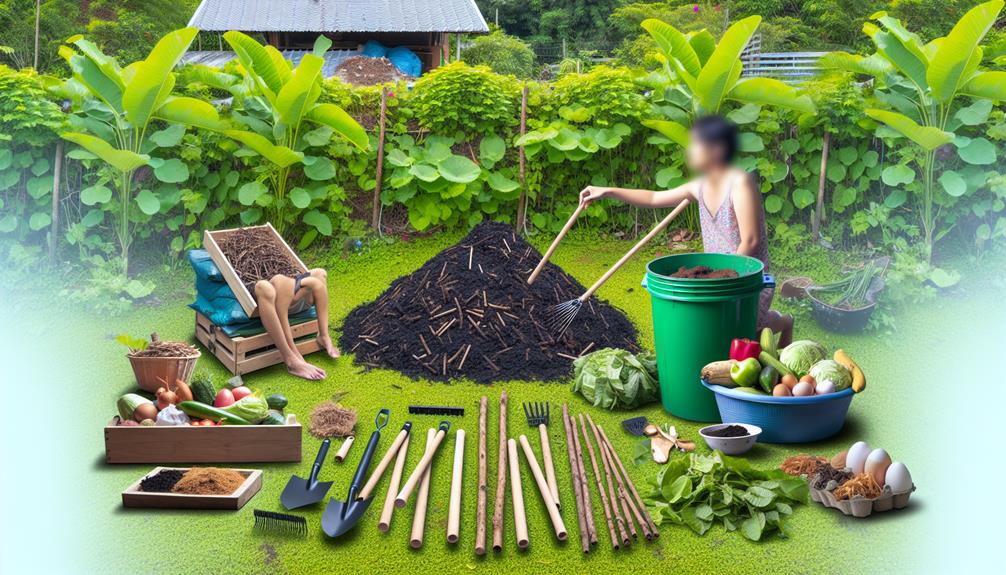

You can compost wooden and bamboo skewers, but it requires a bit of preparation. Break them into smaller pieces, about two inches long, for efficient decomposition. Make sure they’re clean, as food residue can attract pests and disrupt the composting process. Wooden and bamboo skewers are considered brown materials, which balance well with green materials like fruit scraps.
Regularly turn your compost pile and monitor moisture to maintain the right conditions for decomposition. Avoid composting plastic or metal skewers; instead, repurpose or recycle them. For more tips on optimizing your composting efforts, you’ll find detailed guidance on maintaining a healthy compost pile.
Understanding what materials can be composted is crucial for creating a successful composting system. You’ll need to know which items break down efficiently and contribute to nutrient-rich compost.
Organic materials like fruit and vegetable scraps, coffee grounds, and eggshells are a given. However, you might be curious about newer options like biodegradable plastics and compostable packaging.
Biodegradable plastics are designed to break down more easily than traditional plastics. But be cautious; not all biodegradable plastics are compostable. Some require industrial composting facilities to break down properly.
When adding biodegradable plastics to your compost, check if they’re certified compostable by recognized standards like ASTM D6400.
Compostable packaging is another eco-friendly option. Items labeled as compostable are made to decompose in composting conditions, turning into valuable compost material. These include certain food containers, utensils, and even some types of skewers!
Make sure any compostable packaging you add is free from non-compostable elements like metal or conventional plastic coatings.
When considering compostable options, it’s important to know the different types of skewers available for your eco-friendly grilling needs. Understanding these options helps you make informed choices that align with your commitment to sustainability.
First, let’s talk about plastic skewers. While they’re durable and often reusable, plastic skewers aren’t compostable. They can last for several grilling sessions, but eventually, they contribute to plastic waste. If you’re aiming for a zero-waste lifestyle, you might want to avoid them.
Next, reusable skewers are a fantastic eco-friendly option. Made from materials like stainless steel, these skewers can be used innumerable times, reducing waste significantly. They’re easy to clean and perfect for those who grill frequently. Investing in high-quality reusable skewers means you won’t need to replace them often, making them a cost-effective and sustainable choice.
Also Read: Can You Compost Cat Feces?
When composting wooden skewers, you’ll need to break them into smaller pieces to speed up the process. Make sure to add them to a balanced compost mix, combining green and brown materials.

To start composting wooden skewers, you’ll need to break them into smaller pieces for faster decomposition. Cutting them into two-inch segments works well. This increases the surface area, allowing microbes to break down the wood more efficiently.
Next, add the broken skewers to your compost bin. Make sure you balance them with green materials like vegetable scraps and grass clippings. Wooden skewers are considered a brown material, so maintaining a good ratio is essential for best composting results. Aim for a mix that’s approximately one part green to two parts brown.
Keep an eye on the compost temperature. Ideally, your compost pile should maintain a temperature between 135°F and 160°F. This range promotes the activity of thermophilic bacteria, which are crucial for breaking down tougher materials like wood.
Turn the compost regularly. Aerating the pile ensures that oxygen reaches all parts, which speeds up decomposition and prevents the pile from becoming anaerobic. This also helps to distribute heat evenly, keeping the compost temperature consistent.
Monitor moisture levels. Your compost should be as damp as a wrung-out sponge. If it’s too dry, decomposition slows down; if it’s too wet, it could become smelly and attract pests.
Considering your efforts in composting wooden skewers, it’s important to understand their broader environmental impact. Composting these skewers helps reduce your carbon footprint by diverting waste from landfills. Wooden skewers are biodegradable, breaking down naturally over time, which contributes to waste reduction. When you compost them, you’re not just disposing of waste responsibly; you’re also enriching the soil with organic matter.
By choosing wooden skewers over plastic ones, you’re making a significant environmental choice. Plastic skewers don’t decompose and can linger in the environment for hundreds of years, contributing to pollution. In contrast, wooden skewers break down into beneficial compost, supporting plant growth and soil health.
Additionally, producing wooden skewers typically involves a lower carbon footprint compared to their plastic counterparts. Wood is a renewable resource, and responsibly sourced wood contributes to sustainable forestry practices. When you consider the entire lifecycle of the skewer—from production to disposal—wooden skewers are a more eco-friendly option.
Bamboo skewers are an eco-friendly alternative to plastic or metal options, perfect for grilling and composting. When you choose bamboo, you’re adopting sustainability practices that help reduce waste. Bamboo is a fast-growing plant, making it a renewable resource. Using bamboo skewers supports waste management efforts, as they break down naturally in compost piles.
To compost bamboo skewers effectively, start by ensuring they’re clean and free of food residue. Rinse them off if necessary. Next, break the skewers into smaller pieces; this speeds up the decomposition process. Add them to your compost pile along with other organic materials like vegetable scraps and yard waste. Regularly turn your compost to maintain proper aeration, which aids in breaking down bamboo quickly.
Bamboo skewers decompose faster than their plastic counterparts, contributing valuable nutrients back to the soil. Plus, using compostable materials like bamboo aligns you with a community that values eco-friendly choices.
While bamboo skewers offer a compostable option, metal skewers provide a reusable and durable alternative for grilling. These skewers are made from materials like stainless steel, which guarantees skewer durability and can withstand high temperatures without breaking or burning. This makes them ideal for repeated use, reducing waste and promoting sustainability in your grilling habits.
When your metal skewers eventually wear out, consider metal recycling. Metal recycling is an environmentally friendly way to dispose of old skewers, contributing to the reduction of landfill waste and the conservation of natural resources. Simply check with your local recycling center to confirm they accept metal items, as not all facilities may have the capability to process them.
To keep your metal skewers in top condition, clean them thoroughly after each use. Use a brush to remove any food particles and wash them with warm, soapy water. Dry them completely to prevent rusting, ensuring they last longer and maintain their effectiveness. By taking these steps, you can maximize the lifespan of your skewers and enjoy multiple grilling seasons without the need for frequent replacements. Embrace the durability and reusability of metal skewers for a more sustainable cooking experience.
Also Read: Can You Compost Cabbage?
Enhancing the functionality and longevity of your skewers, various coatings and treatments are available to improve their performance and resistance to wear. However, not all of these are suitable for composting. Let’s explore some common types to help you make informed decisions:
When choosing skewers, consider their end-of-life impact. Opt for untreated or naturally treated options to make sure they’re compost-friendly. By doing so, you’re not only making a sustainable choice but also contributing to a community that values eco-friendly practices. Remember, every small decision counts in creating a greener planet.
To guarantee your composting efforts are successful, it’s vital to clean skewers properly before adding them to the pile.
Food residues can attract pests and disrupt the composting process, so remove any bits of meat or vegetables.
A thorough rinse and scrub can help you avoid these issues and maintain a healthy compost.
Scrubbing skewers immediately after use helps guarantee that food residues don’t harden and makes cleaning much easier. Here are a few practical tips to make sure your skewers are spotless and ready for composting:
Fill a basin with warm water and add a few drops of dish soap. Soak the skewers for about 10-15 minutes to loosen any stuck-on food. Then, use a scrub brush to clean each skewer thoroughly.
If soap and water aren’t enough, try a mixture of baking soda and water. This natural abrasive helps to remove stubborn residues without damaging the skewer material.
After cleaning, dry your skewers completely with a clean towel. Ensure proper storage by keeping them in a dry place, preferably in a container that allows air circulation to prevent mold or mildew.
Properly cleaned skewers, free of food residues, guarantee that your compost pile remains healthy and balanced. When skewers retain food particles, you risk introducing unwanted bacteria and pests into your compost. These contaminants can disrupt the nutrient cycle and compromise soil health, making your compost less effective.
To guarantee a thriving compost, focus on maintaining a balanced mix of green and brown materials. Skewers, typically made of wood, fall into the brown category, contributing carbon to the pile. However, any residual food left on them could throw off this balance, leading to issues like odor and slower decomposition.
Here’s a quick reference guide:
| Material Type | Contribution to Compost | Impact if Contaminated |
|---|---|---|
| Skewers (clean) | Carbon source (brown) | Positive |
| Meat Residue | Nitrogen source (green) | Attracts pests |
| Veggie Residue | Nitrogen source (green) | Decomposes quickly |
| Skewers (dirty) | Potential contamination | Negative |
| Balanced Mix | Healthy compost | Essential |
Clearing food residues from skewers guarantees that your compost stays uncontaminated and effective. To make certain that the skewers you’re adding to your compost pile don’t bring along unwanted bacteria or pests, you’ll need to remove all traces of food.
Different residue types require varied cleaning methods, but using chemical cleaners isn’t the best option here, as they can contaminate your compost.
Here are three steps to effectively remove food residues from skewers:
To prepare skewers for composting, start by removing any remaining food particles and debris. You’ll want to make sure your skewers are clean before adding them to your compost pile. This step is crucial for skewer preparation because it guarantees that your compost remains healthy and free from pests.
After cleaning, break the skewers into smaller pieces. This increases their surface area, promoting quicker decomposition and enhancing compost readiness. It’s a good idea to use garden shears or strong scissors for this task. Consider the materials of the skewers as well—bamboo and wood are compostable, but plastic and metal are not suitable for composting.
Here’s a quick guide to help you:
| Step | Action | Reason |
|---|---|---|
| 1 | Remove food particles | Prevents pests and odors |
| 2 | Clean thoroughly | Ensures a healthy compost pile |
| 3 | Break into smaller pieces | Speeds up decomposition |
| 4 | Check material type | Only compost bamboo or wood |
Also Read: Can You Compost Celery?
Frequently, successful home composting hinges on understanding what materials to include and how to maintain the right balance. To make sure you’re on the right track, focus on compost bin maintenance and the types of organic waste you add.

Here are three key tips:
When you can’t compost certain items at home, exploring eco-friendly disposal alternatives guarantees they don’t end up in a landfill.
One option is biodegradable plastics, which break down faster than traditional plastics and have less environmental impact. Look for skewers made from biodegradable materials, and make sure they’re certified for compostability. If you can’t find these, consider wooden skewers, which are typically considered green waste and can be disposed of in your municipal green waste bin.
Another alternative is to repurpose your skewers. Wooden skewers can be cleaned and used as plant stakes in your garden or as kindling for a small fire.
For metal skewers, recycling is a great option. Many recycling centers accept metal items, so check with your local facility to see their guidelines.
Joining a community composting program is another way to handle items that your home compost system can’t process. These programs often have the capability to handle a wider range of materials.
Yes, skewers’ material can impact your compost’s pH balance. Conduct pH testing regularly to make sure it stays balanced. If you’re using bamboo or wood skewers, they’ll usually break down without altering the pH balance in a major way.
You’re wondering about decomposition rates for skewers in compost. Material types matter: bamboo skewers decompose faster, usually within 6 months to a year, while metal or plastic skewers won’t break down and should be removed.
You’ve got to take into account the material types of your skewers. Bamboo composts well with standard techniques, but metal or plastic ones won’t break down. Stick to organic materials and guarantee proper composting techniques for best results.
Yes, composting skewers can attract pests if you don’t practice proper pest control. Be sure to separate non-compostables and maintain a balanced compost pile. This way, you’ll foster a healthy, pest-free composting community.
Yes, you should break skewers into smaller pieces before composting. This step improves compost texture and speeds up decomposition. Use simple breaking tools like garden shears. It’s an easy way to contribute to a thriving compost community.
To compost your skewers, stick to wooden or bamboo options, as metal skewers aren’t compostable. Remove any food residues before adding them to your compost pile. Break them into smaller pieces to speed up decomposition.
If home composting isn’t feasible, consider eco-friendly disposal alternatives like municipal composting programs. By following these steps, you’ll guarantee that your skewers break down efficiently, contributing to a more sustainable environment.
